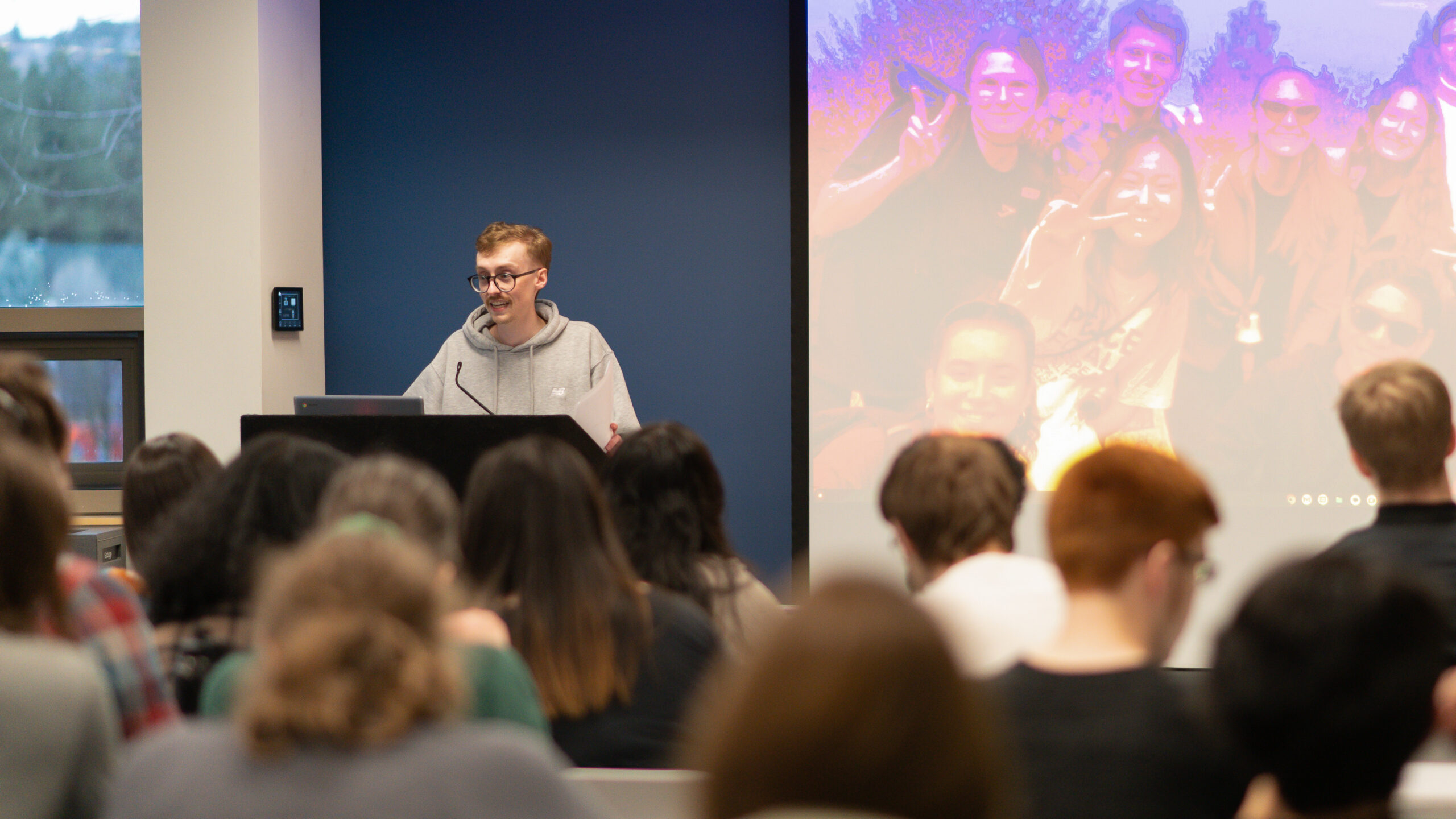Students and faculty gathered on Friday, March 28, to participate in the fourth instalment of Valley Stories, the public reading event sponsored by the Department of Literature, Languages and Performing Arts. The event spotlighted the creative works of several TRU students over the course of two hours and presented an opportunity for student writers to socialize and build community with one another.
Valley Stories is held once every semester and has been an increasingly popular on-campus attraction since Justin Madu, Creative Writing and English assistant professor, started it in the Fall of the 2023/2024 academic year. According to Madu, the first-ever public reading event came out of sheer stubbornness and will on his part. Having experienced similar events as a student, he saw the value of having creative writing students and passionate artists convene in a space and share their stories in front of an audience of peers.
“It did wonders for me, as far as confidence in public speaking and excitement about creative writing,” Madu said. “In writing, there’s always this thing about not having the ‘playoff game’ to invite friends or family to. So, I think it’s kind of nice for these writers to drag their people and say, ‘this is what I’ve been working on.’”
Madu no longer bears the sole burden of organizing the event, as both Catriona Leger of the performing arts department and the English department’s Thom Vernon have contributed significantly over the last few editions. With their help, the event has grown significantly.
“The first one was small,” Madu said. “It was in a lecture hall I was able to book in Old Main and there were maybe 50 people there. It was a lot of fun. It kind of got bigger from there.”
In the most recent installment, which took place in the decidedly larger Student Union Lecture Hall, the room practically overflowed with people. Every seat was filled, and latecomers lined the walls or elected to sit on the floor. If growth continues at a similar rate, Madu and the rest of the team might be forced to find an even bigger space to meet the demand.
One by one, students shared their pieces to the excited crowd of fellow writers and supporters that evening. The works presented ranged from prose to poetry and dramatic works and came from diverse genres and subject matters. Everything from the trans experience to immigrant stories, sci-fi space exploration and ancient Roman speeches was given their moment in the sun. With a five-minute cap for each reading, there was never a dull moment, and the rapid turnaround of presenters ensured the excitement level remained generally above average.
Though all students had the same time, they did not deliver the same way. Some sped through while others took their time. Some read a collection of short poems while others read single, lengthy passages. And while some commanded the room with loud, fearless and dramatic presence, others spoke with lower, shakier voices. Regardless of the approach, every student was able to get their piece out. For Madu, that was the biggest accomplishment.
“The idea of having to read something you’ve written out loud in front of a crowd is scary,” Madu said. “But I think it’s also a huge confidence boost, and that’s helpful, whether you’re in business, sociology, or English.”
Regardless of your field of study, Madu believes that the professional landscape today requires the ability to aggressively self-promote. Public readings like this are, therefore, not just a creative endeavour, but experiences that will shape students to take initiative in selling themselves and their work to wider audiences.
Madu said that having an audience of peers is also a relatively safer place to start, comparing it to his experiences performing in comedy clubs. “You’re not in a room fighting for the attention of a hundred drunk strangers,” he said. “This is the most supportive audience you will ever have.”
“When you’re nervous and go through that nervous experience with other people, there’s a real community that comes from that,” Madu added. “You develop this bizarrely close kind of connection with people who are so different from you in your regular life.”
As the event expands, Madu is considering opening it up beyond just the department of literature, languages and the performing arts. His goal is to make it a long-term staple at TRU, continuing even after he departs from the institution. He has hopes to collaborate with alums and has even contemplated involving the broader Kamloops community. The issue, of course, is that larger crowds mean that management will be more challenging. The potential for disruptions, controversial topics and unruly crowds are all concerns Madu takes seriously and will influence the pace of the event’s expansion.
Expanded or not, Valley Stories has become a much-needed creative space for students on campus to share their artistic accomplishments with a room full of peers. For Madu, the utility of stories lies in the ability for creative spaces to further ideas around equitable and decolonized teaching, by putting equal importance on each person’s stories and perspectives.
“What are the stories that are important to people?” Madu asked. “In creative writing, no information is irrelevant, and you get to use all forms of knowledge and cultural currency in your arsenal to make others lean in. So, in a way, creative writing is both understandable and emotionally correct for many. No one wants to be the one who tells boring stories at parties.”

